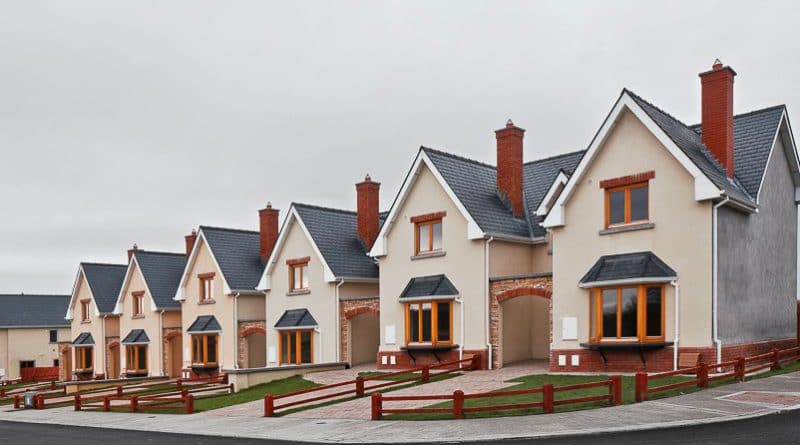CIF warns ‘A withdrawal of the Help To Buy Scheme will exacerbate Ireland’s housing crisis’
The Construction Industry Federation (CIF) has warned that any withdrawal of the Help-To-Buy (HTB) Scheme will further restrict Ireland’s housing supply and compound the housing crisis.
CIF Director General Tom Parlon said: “The Help To Buy scheme has been a significant contributor to the growth in residential construction activity. Any suggestion of a withdrawal of this scheme could have a detrimental impact on confidence and the ability of house builders to maintain and increase their residential building programmes.”
“The Help to Buy Scheme has created a viable market for first time buyers and that has meant that banks have begun to lend once again to builders who are building starter homes again,” Tom Parlon said. “The house price inflation that we are seeing, is happening in the vast majority of cases, in the second-hand home market- a market that those availing of the Help To Buy Scheme are not involved in. These house price increases are driven by scarcity in second hand home market, which accounts for 90% of transactions according to a recent report by Daft.ie.”
“If the price of a new home is €250,000, it will cost the government €15,000 or so under the Help to Buy Scheme and yield €100,000 in direct and indirect revenue – that’s more than a six-fold return to the exchequer.”
“To date the scheme is justified by the positive impact it is having in terms of both boosting supply, stemming from greater investment in residential building, and in ability of first time buyers to purchase a newly built home,” Tom Parlon added. “Our members can confirm that residential building has been made more viable in key locations on account of its introduction by assisting prospective house purchasers with the deposit level, which is now required under the Central Bank’s macro-prudential mortgage lending rules on Loan to Value. It is quite simple; first time buyers can buy homes, so building them becomes viable.”
In a submission to the Independent Impact Assessment for the Minister for Finance of the Help to Buy Tax Incentive, the CIF outlined the body’s considered opinion that the crisis in housing supply had warranted the temporary introduction of the HTB scheme in 2016 to assist in: (1) the viability of new residential building, and (2) the ability of first time buyers to purchase a new home.
“The HTB scheme ultimately contributes to generating other taxable incomes via employment and linkage effects,” Tom Parlon said. “Decisions around tax incentives should always be country and context specific. We strongly believe that the Government and the Department of Finance apply measured tax policy analysis in all fiscal decision making, and therefore in the context of a particular housing supply crisis and a highly developed tax administration system it was prudent to introduce a time bound tax incentive scheme of this nature.”
Members of the Irish Home Builders Association, a constituent association of the CIF which represents residential building members, have expressed their full support for the HTB scheme.
According to the IHBA the HTB scheme has been a major factor in their ability to present viable residential development proposals to their funders to secure the required development finance and commence development. This is reflected in the increase in residential building activity experienced since introduction of the HTB scheme.
There are over 250 qualifying contractors currently registered for the HTB scheme.
The Construction Industry Federation estimates that the level of new residential completions for 2017 will be in the region of 18,000 units. This compares to 12,666 units in 2015, illustrating an overall increase of 42% from 2015-2017.
In total 3,860 residential units were commenced in the 3 month period January to March 2017. The figures represent an increase of +33% (958 units) on the total number of units commenced during the same period in 2016. The rolling 12 month figure shows an increase of +37.6%% in terms of overall commencements for the 12 month period to the end of March 2017.
In addition: Individual/One Off housing units represent just 26.7% of total commencements in the first 3 months of 2017, and increased by +33.7% on the same period in 2016. Counties: Kildare (+236%), Louth (+163.6%), Meath (+166.5%), Wexford (+172.7%), Dublin City (+49.3%), South County Dublin (+83.4%), Galway City and County (+2800% and +86.8%) showed some of the largest increases in overall commencement numbers.
In total 3,896 residential units were completed in the 3 month period January to March 2017. The rate of house completions in the first 3 months of the year represents a +23.9% increase in activity on the same period in 2016 and a +19% increase on the rolling 12 month period to the end of March 2017.
The average monthly completion figure currently stands at 1,298 units.
The 3,896 residential units completed in first 3 months of 2017 can be broken down by type as follows: Individual/One Off Units: 1,543 units or 39.6%, Scheme Units: 1,701 units or 43.7%, Apartments: 652 units or 16.7%.
In total 3,786 residential units were registered under the HomeBond house building insurance scheme in the 5 month period January to May 2017. The figures represent an increase of +67.7% (1,529 units) in developer led activity nationally on the same period in 2016. The majority of housing units registered were in Dublin (2,100 units), Meath (587 units), Kildare (255 units), Cork (225) Limerick (121) and Wicklow (119 units).
[rev_slider BluBeam]

